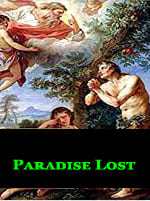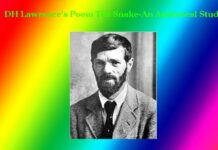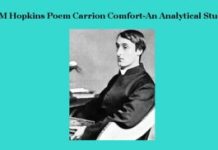John Milton | Paradise Lost | A Review
John Milton’s ‘Paradise Lost’-A Review
John Milton’s “Paradise Lost” is an epic poem that was first published in 1667. It is considered one of the greatest works in the English language and has had a lasting impact on literature and culture.
The poem is divided into twelve books and tells the story of the Fall of Man, starting with Satan’s rebellion against God and the expulsion of Adam and Eve from the Garden of Eden. It explores complex themes such as the nature of evil, free will, temptation, and redemption.
One of the most remarkable aspects of “Paradise Lost” is its use of language. Milton’s verse is powerful and majestic, with rich imagery and complex metaphors that create a vivid and immersive world. The poem’s famous opening lines, “Of Man’s first disobedience, and the fruit / Of that forbidden tree whose mortal taste / Brought death into the world, and all our woe,” set the tone for the epic story that follows.
Milton’s portrayal of Satan is one of the most memorable and influential characterizations in English literature. He is depicted as a charismatic and tragic figure, a rebel who is both admirable and repulsive. Satan’s speeches are among the most eloquent and passionate in the poem, and his struggle against God is presented as a heroic endeavor.
The portrayal of Adam and Eve is also notable. They are depicted as innocent and vulnerable beings who are easily swayed by temptation, but who also possess a deep capacity for love and virtue. Milton’s depiction of their relationship is both tender and complex, and their fall from grace is presented as a tragedy of immense proportions.
“Paradise Lost” has been the subject of much debate and analysis over the years. Some readers have criticized the poem for its portrayal of God as remote and inscrutable, while others have praised it for its exploration of complex philosophical and theological ideas. The poem’s treatment of gender and sexuality has also been the subject of much discussion, with some readers arguing that it perpetuates patriarchal and misogynistic ideas.
Despite its controversial aspects, “Paradise Lost” remains a powerful and influential work that has had a lasting impact on literature and culture. Its themes and characters continue to resonate with readers and inspire new generations of writers and thinkers. 0 0 0.
N.B. The article originally belongs to the book entitled ‘Reviews of John Milton’s Literary Works‘ by Menonim Menonimus.
Books of Literary Criticism by M. Menonimus:
- World Short Story Criticism
- World Poetry Criticism
- World Drama Criticism
- World Novel Criticism
- World Essay Criticism
- Indian English Poetry Criticism
- Indian English Poets and Poetry Chief Features
- Emily Dickinson’s Poetry-A Thematic Study
- Walt Whitman’s Poetry-A Thematic Study
- Critical Essays on English Poetry
- Tawfiq al-Hakim’s Novel: Return of the Spirit-An Analytical Study
- Tawfiq al-Hakim’s Novel: ‘Yawmiyyat Naib Fil Arayaf’-An Analytical Study
- Analytical Studies of Some Arabic Short Stories
- A Brief History of Arabic Literature: Pre-Islamic Period (500 AD-622 AD)
- A Brief History of Arabic Literature: Early Islamic Period (622 AD-661 AD)
- Reviews on William Shakespeare’s Works
- Reviews of John Milton’s Literary Works
- Reviews of Some Iconic Travelogues …
Additional Searches:
- John Milton
- John Milton’s Literary Works
- John Milton’s Paradise Lost
- John Milton’s Paradise Regained
- John Milton Samsun Agonistes
- John Milton’s Camus
- John Milton’s Lyicdas ….











